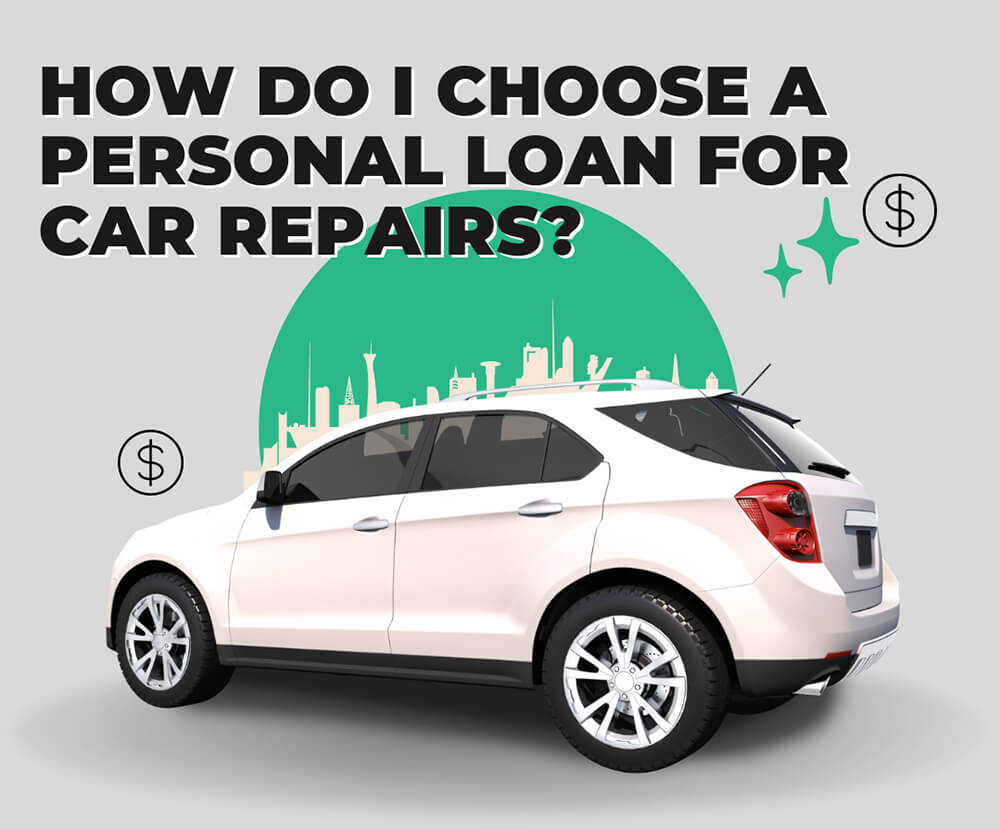
How Do I Choose a Personal Loan for Car Repairs?
When you own a car, repair costs are inevitable at one point or another. Based on recent stats, each vehicle needs an unscheduled repair once every two years, and the average auto repair costs amount to $652.
While some have enough available funds in their bank account, others may not have the proper financial resources, or at least not in full. This is especially true for emergency car repair situations for which you cannot budget in advance.
In these situations, taking out a personal loan is typically one of the most effective ways to cover the costs of car repairs.
If you are considering this option, this article will give you some helpful tips to help you choose the best personal loan for car repairs.
Estimating Your Overall Costs
When taking out a personal installment loan for car repair financing, the first thing you need to know is how much you are going to borrow. This is equal to the total repair cost minus whatever available cash you may already have.
Many car repair chains, like Repair Pal or Your Mechanic, offer free online tools where you can enter your location, vehicle information, and the type of repair or service you need and obtain an estimate of the cost.
However, car owners don’t always have the tools to assess the type of vehicle repair they need, so it’s best to visit a mechanic of your trust in person and obtain a professional opinion.
If the cost is still higher than what you can afford, then borrowing the remaining amount is a valid option.
Factors to Consider When Applying for a Personal Loan
There are numerous elements to consider when applying for a personal loan. Here are the most important ones to consider.
Interest rate – It refers to the cost of borrowing money, usually expressed as a percentage. It can be fixed, meaning that it remains constant over the duration of the loan, or variable, meaning that it can change depending on market conditions. How much you will pay interest depends on several factors that we will cover in the next section.
Loan amount – As pointed out earlier, your loan amount should match the cost of your car repairs minus the cash you already have available.
Other fees – In addition to paying interest on your loan, there are also fees involved. These include the loan’s origination fee, late payment charges, and other transfer fees. Make sure to check every tiny detail before you sign the loan agreement.
Repayment term – It refers to the loan length, that is, the time you have to pay back the loan. Generally, borrowers who require a more considerable loan amount and can make regular payments should opt for a longer loan period.
Repayment Option – These refer to how frequently you have to make payments. Many people choose to make a monthly payment. However, lenders offer weekly and biweekly payments too.
What Criteria Will The Lender Use to Assess My Loan Application?
Lenders use a number of criteria to determine whether to accept an unsecured loan application, the maximum amount you can borrow and the interest rate you’ll have to pay. Here is the most important one.
Your credit score – It refers to a three-digit number ranging from 300 to 850 that reflects your credit history and how willing you are to take on new debt. Generally, the better your score is, the more favorable terms you will be offered.
Your employment situation – Lenders want to ensure you have an income that allows you to repay the loan. That is why they usually ask for proof of employment or any other stable source of income.
Your debt-to-income ratio – It’s a measure of how much you have to pay on debt in comparison to your income. Banks generally use your debt-to-income ratio to indicate your ability to make timely payments. The lower this indicator, the better. Overall, it would be best if you kept it below 43%
Your repayment history – Also known as your credit report, it’s a record of how you’ve managed your past loans and debts. Lenders will carefully review it to assess the risk of lending you money.
How to Select the Best Personal Loan Provider
All the previously mentioned criteria being equal, different lenders offer different rates, terms, and conditions.
For example, if your credit score could be better, some banks may decline your application, others may set a lower maximum amount, and others may still offer a higher interest rate.
It’s essential to do your research and compare different offers in order to select the best option according to your needs.
To help you in this process, you can use online comparison tools that allow you to compare different loan providers side by side, taking into account all of the aforementioned criteria.
Reliable online lenders like Level may offer better rates and more flexible terms than traditional banks, as they have lower overhead costs. The Level of personal touch and customer service is also usually higher than the big banks, for which you tend to be just another number.
What Are My Other Options to Cover my Car Repair Expenses?
In some scenarios, it is also wise to consider other types of auto repair financing options. Here are some examples.
Credit card – If you are already a credit card holder, and you are confident you can pay the outstanding balance before the end of the month (thus avoiding being charged an interest rate), then you should go for this option. Typically, using your credit card if you can’t repay the outstanding balance at the end of the month is not advisable, as the interest rate charged by credit card providers is usually higher than that charged by personal loan providers. At the same time, a credit card can be a last resort if no private loan provider accepts your application.
Payday loans – If the difference between your car repair cost and what you have to borrow is not significant, you can consider a payday loan. However, keep in mind that the interest rate on these loans is usually very high, so make sure you can repay the borrowed amount fast.
Friends and family – If you have a good relationship with your friends and family, consider asking them for a loan. This is usually the most cost-effective option, as the interest rate charged is generally very low or even zero. However, remember that not repaying the money on time may strain relations with your dear ones.
Secured personal loan – While an unsecured personal loan may be harder to obtain if you don’t have a good credit score, secured loan providers are not as strict when it comes to your credit check. However, it requires you to pledge something you own in exchange for borrowed money that you repay over time with interest. They are a valid financing option for those with bad credit.
Peer-to-peer loans – Peer-to-peer (P2P) lending is a relatively new way of financing. In this case, you agree with a person or group of people to borrow money without the need for a bank or financial institution. While interest rates are usually lower than those set by banks, you must bear in mind the risk associated with it, such as the fact that financial protection laws do not cover P2P lenders.







Sorry, the comment form is closed at this time.